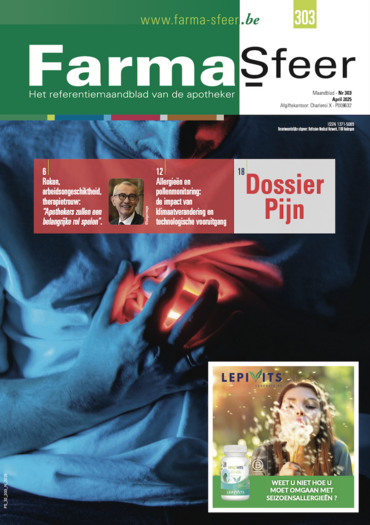Deze week schaart ons land zich op de Europese ministerraad officieel achter de voorbereiding van een ban op duizenden PFAS. Dat schrijft De Standaard.
In juli hadden Nederland, Duitsland, Denemarken, Zweden en Noorwegen al aangekondigd dat ze samen een voorstel gingen uitwerken om de productie, de verkoop en het gebruik van álle PFAS in Europa te verbieden, op enkele "onmisbare" toepassingen na, zoals bijvoorbeeld voor medische toestellen. Ons land zal zich deze woensdag, op de Europese ministerraad voor Milieu in Luxemburg, aansluiten bij die landen en aandringen om "snel en ambitieus" vooruitgang te boeken met het voorstel van de vijf landen.
Opmerkelijk: de landen stellen niet de toxicologische eigenschappen van individuele PFAS centraal. Ze hebben het veeleer gemunt op één specifieke chemische eigenschap die de hele PFAS-familie typeert en die volgens de landen een algemeen risico voor de mens en het milieu betekent: de persistentie van de stoffen. Alle PFAS kunnen slechts met grote moeite afgebroken worden, of ze transformeren naar stoffen die onvergankelijk zijn. Daardoor blijven ze zich opstapelen in het milieu. Het heeft hen de bijnaam "forever chemicals" opgeleverd.
De persistentie van chemische stoffen speelt al decennialang een rol bij hun beoordeling, maar de laatste jaren worden de stemmen luider om persistentie een prominentere rol te geven in de regelgeving, los van wat geweten is over de giftigheid van de stof.


















Laatste reacties
Julie MATHEUS
29 februari 2024The purpose of this proposal is to convene a business meeting aimed at addressing the concerning revelations regarding environmental corruption and negligence within the Flemish department of the environment, particularly concerning the multinational conglomerate 4Ever and the contamination of soil and waterways with the cancer-causing chemical PFOS. The meeting will gather key stakeholders involved in environmental regulation and oversight to discuss necessary reforms and actions to prevent such instances of corruption and negligence in the future. The meeting is scheduled to take place on [Insert Date], at [Insert Time], at [Insert Location].
The circumstances leading up to this proposal have been marked by a series of alarming events, including the discovery of elevated levels of PFOS in soil and water near the 4Ever plant, subsequent revelations of corruption and malpractice within the environmental department, and the failure to enforce regulations effectively. These revelations have raised serious concerns about public health, environmental protection, and the integrity of regulatory processes in our region.
Facts and Events:
The current situation demands immediate action to address the systemic issues identified within the environmental department. Several changes are proposed to rectify the existing deficiencies and prevent similar occurrences in the future:
1. Enhanced Oversight and Accountability: Implement stringent measures to ensure transparency and accountability within the environmental department. This includes establishing independent oversight mechanisms to monitor regulatory compliance and investigate allegations of corruption or malpractice.
2. Strengthened Enforcement Procedures: Revise enforcement procedures to impose more substantial penalties on corporations found to be in violation of environmental regulations. This may involve revisiting existing legislation to increase fines and penalties for non-compliance.
3. Employee Protections: Safeguard employees within the environmental department against reprisals for reporting misconduct or advocating for stricter enforcement of environmental policies. Establish whistleblower protection programs to encourage the disclosure of wrongdoing without fear of retaliation.
4. Public Engagement and Awareness: Enhance public engagement initiatives to raise awareness about environmental issues, promote citizen participation in monitoring efforts, and foster community involvement in decision-making processes related to environmental protection.
The proposed changes aim to address the root causes of corruption and negligence within the environmental department and establish a framework for more effective environmental governance in the future. By implementing these reforms, we can mitigate the risks posed by environmental contamination, protect public health, and safeguard the integrity of our regulatory institutions.
Impact of Changes:
The suggested changes are expected to have a profound impact on environmental regulation and oversight in our region. By enhancing oversight and accountability mechanisms, we can detect and prevent instances of corruption and malpractice before they escalate into significant environmental crises. Strengthening enforcement procedures will deter corporations from flouting regulations and prioritize compliance with environmental standards.
Moreover, by protecting employees within the environmental department and promoting public engagement, we can foster a culture of transparency, integrity, and accountability in environmental governance. This will not only improve regulatory outcomes but also enhance public trust in the effectiveness of environmental protection measures.
Outcome:
In conclusion, the proposed business meeting presents an opportunity for key stakeholders to collaboratively address the systemic issues plaguing environmental regulation and oversight in our region. By implementing the suggested changes and prioritizing transparency, accountability, and public engagement, we can mitigate the risks associated with environmental contamination and uphold our commitment to safeguarding public health and the environment.
Recommendations for the future include:
1. Immediate implementation of oversight and accountability measures.
2. Revision of enforcement procedures to impose stricter penalties for non-compliance.
3. Establishment of whistleblower protection programs to safeguard employees.
4. Enhancement of public engagement initiatives to promote citizen participation.
It is imperative that we act swiftly and decisively to address these challenges and ensure a sustainable and healthy environment for current and future generations. We look forward to productive discussions and meaningful outcomes at the upcoming business meeting.
Sincerely,
Julie Matheus
Business Meeting Proposal Technical Engineers
Introduction:
We propose convening a business meeting to address the critical shortage of technical industrial engineers within the Flemish, Walloon, and Brussels Capital Regions. This meeting will gather stakeholders from academia, industry, and government to strategize solutions for mitigating the shortage and ensuring a sustainable pipeline of skilled professionals in the field. The meeting is scheduled to take place on [date] at [location], with the objective of identifying actionable measures to tackle the root causes of the shortage and foster a conducive environment for attracting and retaining talent in technical sciences.
The circumstances leading up to this proposal stem from identified shortages of technical industrial engineers, primarily attributed to insufficient graduate supply and low interest among young people, especially girls, in technical science disciplines. Moreover, the complexity of accessing certain professions due to the requirement of multiple certificates exacerbates the challenge of attracting students. Additionally, increasing employer demands for technical expertise, management capabilities, and soft skills further compound the issue. Despite initiatives such as the 'Choose STEM' program aimed at attracting more technicians, the shortage persists, necessitating a comprehensive approach to address the underlying factors.
Facts and Events:
To address the shortage of technical industrial engineers, we propose several changes:
1. Enhanced Promotion of Technical Sciences: Implement targeted marketing campaigns to increase the appeal of technical science disciplines among young people, with a particular focus on attracting girls. Collaborate with educational institutions and industry partners to organize outreach programs and career fairs highlighting the diverse opportunities in technical fields.
2. Streamlined Certification Processes: Simplify the certification process for accessing professions like HVAC technicians to remove barriers and encourage more students to pursue technical education. This could involve standardizing certification requirements and providing support mechanisms for students navigating the certification process.
3. Curriculum Enhancement: Work with educational institutions to revise curricula and incorporate practical training modules aligned with industry demands. Introduce interdisciplinary courses that develop not only technical skills but also management and leadership capabilities, ensuring graduates are equipped to meet evolving employer requirements.
The impact of these changes is expected to be significant. By increasing the attractiveness of technical science disciplines and streamlining access to professions, we anticipate a rise in the number of students enrolling in relevant programs. Moreover, enhancing curriculum offerings will better align graduate skills with industry needs, reducing skill mismatches and improving workforce readiness.
Outcome:
In conclusion, addressing the shortage of technical industrial engineers requires a multifaceted approach involving collaboration between academia, industry, and government. By implementing the proposed changes, we can create an environment conducive to attracting and retaining talent in technical fields, ultimately bolstering the region's industrial competitiveness and ensuring a sustainable supply of skilled professionals for the future. We recommend establishing a task force to oversee the implementation of these measures and monitor progress towards addressing the shortage effectively.